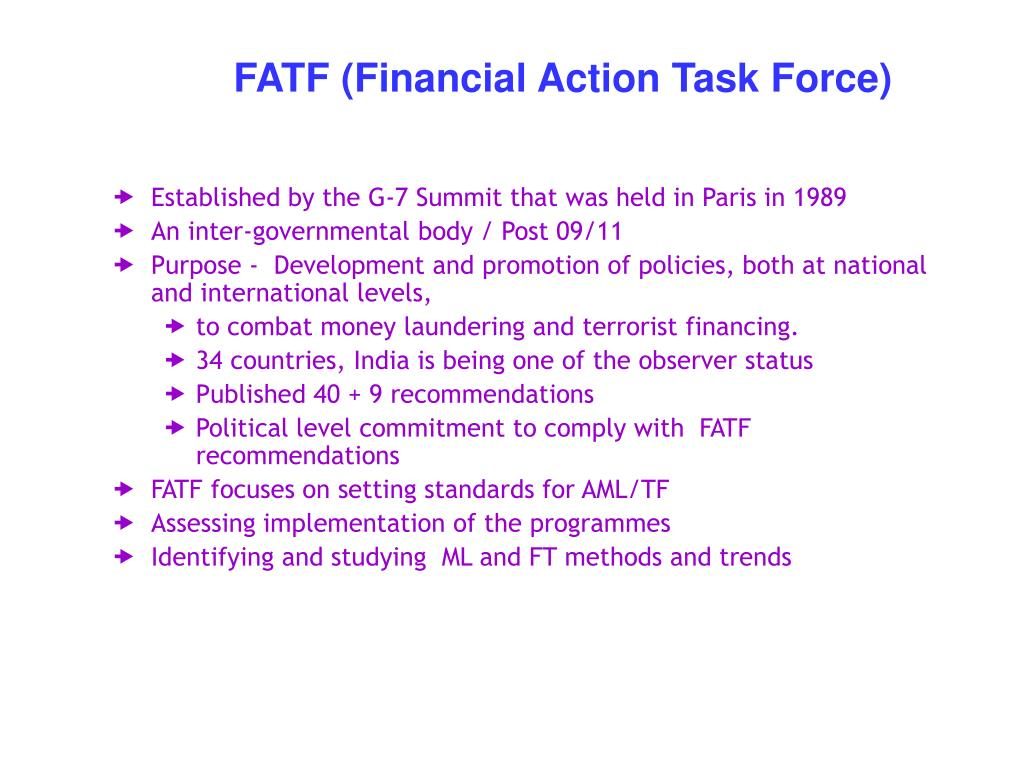Relevance: Prelims/Mains : G.S paper III: Economy: Important International institutions, agencies and fora, their structure, mandate.
Context:
• Financial Action Task Force, the global watchdog group, has decided to grant Pakistan and other countries on its watch list a three-month extension on fulfilling commitments, in view of the pandemic.
What is Financial Action Task Force?

• The Financial Action Task Force is an intergovernmental organization founded in 1989 on the initiative of the G7 to develop policies to combat money laundering.
• In 2001, its mandate was expanded to include terrorism financing. It designs and promotes policies and standards to combat financial crime.
• Recommendations created by the Financial Action Task Force (FATF) target money laundering, terrorist financing, and other threats to the global financial system.
Pending reforms:
• Pakistan was placed on the grey list or “increased monitoring” list in June 2018.
• It was given time until October 2019, in order to complete a 27-point action plan on countering terror finance and anti-money laundering.
• Failing that, it would be put on the black list of “high-risk jurisdictions” facing severe financial sanctions.
• This means that in effect, Pakistan will have had at least one extra year to meet its deadlines, despite the fact that it has only completed about 14 points so far.
• The remainder is still a tall order. It includes improving:
- mechanisms to curb terror financing;
- amending laws to curb ‘Hawala’ transactions;
- placing sanctions against cash couriers who facilitate terror groups;
- completing the prosecution of groups banned by the UNSC and;
- converting madrassas run by them into formal schools.
No accountability:
• Each item demands more accountability by Pakistan on terror groups.
• Despite this being Pakistan’s third stint on the FATF watch list (prior occasions were in 2008 and 2012-2015), there is little evidence that it has yet internalised that message.
• In a U.S. report on terrorism released last week, Pakistan remains a “safe haven” for most UN proscribed groups.
• The report also adds that its steps to prosecute certain leaders of JeM and LeT are inadequate.
Tacit support to terrorist groups:
• In the past year, Pakistan has pursued indictments against LeT leaders, but not on serious charges.
• Even 26/11 mastermind Hafiz Saeed has only been convicted for “being part of a banned terrorist outfit” and for “having illegal property”.
• Meanwhile, LeT operations commanders Zaki Ur Rehman Lakhvi, Sajid Mir, and JeM chief Masood Azhar appear to be at large.
• Pakistan Prime Minister Imran Khan’s reference in its Parliament to al-Qaeda founder Osama Bin Laden as a “martyr” underlines the establishment’s attitude to these groups.
• Pakistan’s failed attempt to have the UNSC designate four Indians as terrorists last week — it was vetoed by the U.S. — speaks to its lack of credibility on the issue.
• Pakistan is counting on its role in facilitating the Afghanistan peace deal by pushing Taliban leaders to participate in order to mitigate its troubles at the FATF.
Conclusion:
• Eventually, given the rigorous FATF action plan, and the combined pressure of countries in the group, Pakistan would do well to realise that only clear and consistent actions would free it from the commitments at the FATF.
• In any case, giving a free rein to terror groups cannot be in its own interest.
• Pakistan has bought time, but it cannot back away from its commitments to the FATF
For more such notes, Articles, News & Views Join our Telegram Channel.
Click the link below to see the details about the UPSC –Civils courses offered by Triumph IAS. https://triumphias.com/pages-all-courses.php

